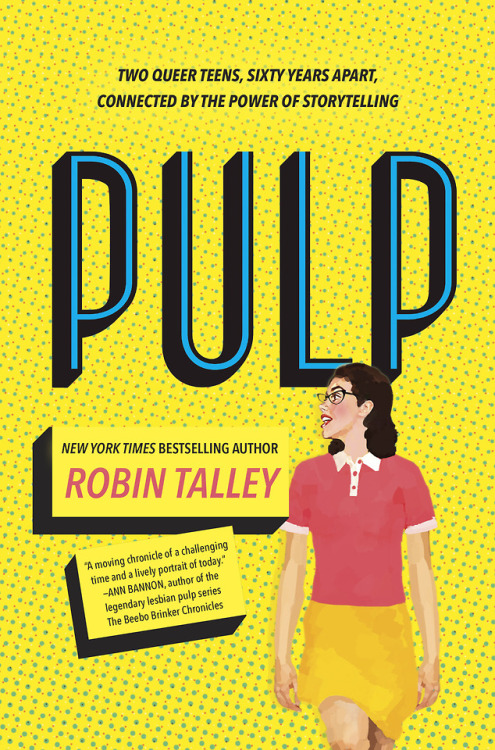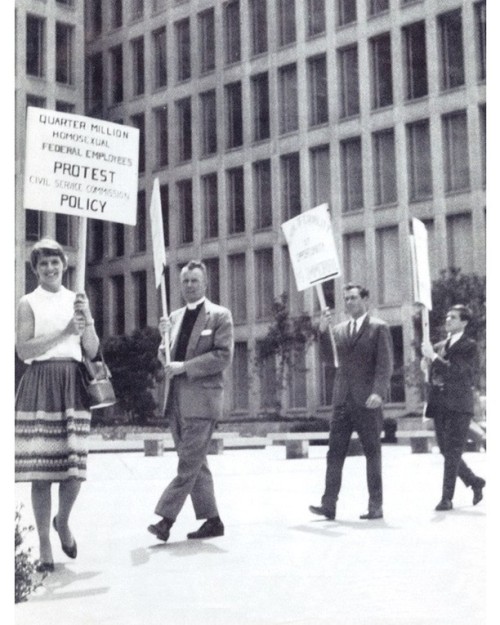#lavender scare
Pulp by Robin Talley
8/10
Do the wlw end up together : No
This was a fun one because it follows two parallel story lines in completely different settings. In 2017, Abby Zimet struggles to keep up with her schoolwork and college applications as she becomes obsessed with researching lesbian pulp fiction novels, especially mysterious author Marian Love. She’s writing her own pulp novel for her senior thesis and jumps in headfirst to avoid dealing with her parents’ disintegrating marriage. Meanwhile, in 1955, Janet Jones is discovering that she’s no longer alone through the world of lesbian fiction. In the peak of the Lavender Scare in DC she’s trying to keep her own writing hidden to protect her girlfriend Marie, whose State Department job is at risk. I don’t think I’ve read any fiction taking place during the 1950s government purges so if this isn’t a topic you know a lot about, pick this book up. Or if you’re at all curious about lesbian pulp fiction, which can also be a lot of fun. Abby discovers that a lot of pulp titles have been re-released and are available to purchase pretty much everywhere. The first lesbian book I bought myself was a brand new copy of Ann Bannon’s Odd Girl Out with it’s original lurid cover that I found while wandering around my local Barnes & Noble. It’s hard to overstate their cultural relevance while they were being published and they’re still interesting to read today for more than just historical context. Talley does a great job balancing a lot of serious history with Abby’s experiences in the present. It’s a book that could easily have been a depressing and mournful read and instead shows how things do get better. It’s hard to compare Janet’s life with Abby’s, as Abby came out to her parents in ninth grade at a very anticlimactic dinner. While that’s obviously not everyone’s experience, the world as a whole is so different from sixty years ago that it’s hard for Abby to understand Marian Love’s life. It’s interesting to see how she builds Marian and her characters up as the ideal of love and perfection without really knowing anything about Marian. At times Abby was definitely not my favorite person in this book. Without giving too much away, I don’t entirely disagree with a lot of what Linh said during her and Abby’s fight on the train. Throughout the book Abby pushes away her friends and her real life in pursuit of the real Marian Love as a way of distancing herself from her parents. I loved that you can feel Abby’s anger and fear through the book and the fact that it ultimately brings her closer to her brother. Her emotions felt painfully real and I thought it was interesting that her character development mirrors that of her ability to write her novel’s protagonist. Initially angry and one-dimensional she begins to reach out to other people and develop the connections that will help her move forward, just as her writing takes shape and creates characters with nuanced motivations and actions. All in all, if you like history and you feel like fiction can have to power to change people’s lives, you’ll find a fantastic set of characters in these pages.
Post link
“QUARTER MILLION HOMOSEXUAL FEDERAL EMPLOYEES PROTEST CIVIL SERVICE COMMISSION POLICY,” members of the East Coast Homophile Organizations (ECHO) (including Craig Rodwell, far right, and Lilli Vincenz, left) picket the Civil Service Commission, Washington, D.C., June 26, 1965. Photo by Kay Tobin, c/o @nyplpicturecollection.
.
On June 26, 1965, fifty-two years ago today, members of the East Coast Homophile Organizations (ECHO) continued with their controversial new direct-action approach, holding a protest at the Civil Service Commission (CSC), the federal agency charged with implementing the government’s “merit-based hiring” scheme.
.
While the group previously had picketed the White House (twice, in fact, once on April 17, 1965, and again on May 29), the CSC protest was of particular importance to Frank Kameny, the president of Mattachine Society Washington (MSW), who lost his government job in 1957 pursuant to CSC regulations requiring the termination of known homosexuals.
.
The protest garnered enough press that CSC officials soon requested a meeting with MSW members; while it took another decade before the CSC officially changed its policy regarding homosexual employees, the meeting between gay activists and federal officials was a historic first.
.
In 2009, John Berry, the openly-gay Director of the Office of Personnel Management, the CSC’s successor agency, formally apologized to Frank Kameny on behalf of the federal government, saying “Please accept our apology for the consequences of the previous policy of the United States government, and please accept the gratitude and appreciation of the United States Office of Personnel Management for the work you have done to fight discrimination and protect the merit-based civil service system.”
.
“Apology accepted,” Kameny responded. #lgbthistory #HavePrideInHistory #Resist #Pride2017 (at Washington, District of Columbia)
Post link


